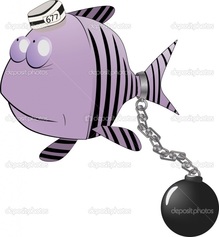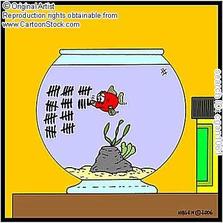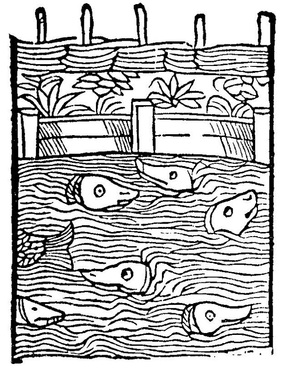|
Hello and welcome to TheFishInPrison.com, the new academic website of one Timothy Stephen Miller, also known by the nom d'académie T. S. Miller and countless other permutations of names, nicknames, and initials in various conference programs and tables of contents. Indeed, one of my goals in setting up this website is simply to establish and consolidate my identity in one publically and permanently accessible location. The more important purposes behind this site, however, involve experimentation with a personal web space as a venue for "publishing" parts of my work not suitable for traditional print publication (e.g., continually updated bibliographies and databases, and any other dabblings in digitally humanistic endeavors that I may undertake). But the mistaken identity problem has become an irritating one for me. For example, I learned early on in my academic career about a noted Byzantinist who continues to publish as Timothy S. Miller, and I next discovered yet another Timothy Miller working in my secondary field of science fiction studies. I'd thought I'd landed upon the solution in trying to publish as often as possible as "T. S. Miller," without anticipating that an aspiring musician with those initials would establish various social media presences that still overshadow my own T. S. Miller page on academia.edu. "Tim Miller," which is what folks usually call me, has of course already been monopolized by the controversial performance artist known to surprise male members of his audience with lap dances and have his NEA grants revoked. This Timothy S. Miller, yours truly, is currently a late-stage Ph.D. candidate at the University of Notre Dame working primarily on medieval English literature. My dissertation examines Chaucer's narrative endings in the context of medieval theories of closure and contemporary narratology, and as the most contested sites in the author's reception history. The full abstract will be up elsewhere on this site shortly, as will the complete CV. I would consider myself a Chaucerian above all else, but my interests tend towards chronologically eclectic: without quite trying to, I've published on texts from Vergil to Beowulf and Chaucer to Junot Díaz. In my author biographies in journals, I like to acknowledge jocoseriously that an interest in science fiction and fantasy has been the "secret vice" of many a medievalist before me -- jocoseriously because I should find out very soon the extent to which this not-so-secret vice will impact my job search. And here I am, years late to the world of academic blogging, although I have heard that most academic blogs begin right here, in the later stages of the dissertation. If I recall correctly, even Chaucer was an ABD when he began blogging seriously. I chose the name "The Fish in Prison" for my new online presence (including @TheFishInPrison) because of its strange euphony and its near-complete absence from Google: if you want to find out more about the fish in prison, the Internet will lead you here. But what exactly is the fish in prison? The image derives from the end of a passage from Chaucer's dream vision The Parliament of Fowls, in which the Dreamer has been led to an imposing gate with conflicting inscriptions written on it: "'Thorgh me men gon into that blysful place Of hertes hele and dedly woundes cure; Thorgh me men gon unto the welle of grace, Ther grene and lusty May shal ever endure. This is the wey to al good aventure. Be glad, thow reder, and thy sorwe of-caste; Al open am I -- passe in, and sped thee faste!' 'Thorgh me men gon,' than spak that other side, 'Unto the mortal strokes of the spere, Of which Disdayn and Daunger is the gyde, Ther never tre shal fruyt ne leves bere. This streem yow ledeth to the sorwful were Ther as the fish in prysoun is al drye; Th'eschewing is only the remedye!'" (127-140) My recent encounter with the phrase "the fish in prison" -- I'd read it many times before, but never really paid attention -- constituted one of those jarring but fruitful clashes of the medieval and the modern: in the late 14th century, "the fish in prison" may not have seemed as odd an image as I find it today. But for us in the early 21st century, the word "prison" conjures several associations alien to the medieval reader, including an almost inevitable sense of comedy: we're free to imagine some anthropomorphized cartoon fish behind bars and dressed in an orange jumpsuit or black and white stripes, perhaps glumly sliding a tray down the cafeteria line hoping that the tattooed hammerhead shark won't shiv him on the way back to his cell. In fact, conducting a search for the phrase "fish in prison" in Google Images brings up the following two stock images first and second, respectively: This third image is more what I had in mind: Of course, the image in Chaucer is that of a medieval fishing weir, a fence-like trap of ancient design that, like all effective traps, allows easy ingress but denies egress. There isn't really supposed to be comedy in this image, but feel free to make your own Admiral Ackbar "It's a weir!" joke here. (If anyone knows the original source of this image, please let me know; the website from which I took it attributes it to an "unknown source.")
The fish in prison. I find it an endlessly fascinating phrase -- how many ways there are for a fish to be imprisoned! A fish out of water, literally out of its element in the prison of air; or, as in the second cartoon, a fish bounded in the prison of its paltry domestic bowl, king of considerably less than infinite space; or a fish in a pond, a lake, a stream, a sea, a network of oceans, each larger but finally only a larger confinement; or, finally, a fish trapped in a metaphor used by humans and ignored as a being in itself. A fish trapped in that watery weir, not yet suffocating on land or dying slowly like a crustacean in the cookpot, just a fish stuck in a perfectly fish-like place but a place with walls, a fish that can't get out. In conclusion, I chose to organize my online projects under the banner of "The Fish in Prison" not because it was the perfect metaphor for a doctoral degree in the humanities taking longer than you'd first expected, when you'd initially thought you could do it in the minimum time to degree -- why not, what's the fuss? -- and not because academia itself could be seen to offer the temptation of the fishing weir, in that it seems all too easy to swim right along in the system, but then impossible to get oneself back out of, a course advertised as "the wey to al good aventure" but ultimately nothing but a trap, "the sorwful were" whose only remedy lies in "Th'eschewing," and if not so avoided will keep you perpetually swimming in place against the current, swimming and swimming but not in fact getting anywhere. To all of those who do feel trapped in the academic weir, I would urge you to remember that "The Fish in Prison" is only one side of the gate, half of the story it has to tell. Onward through the weir to "that blysful place"...
4 Comments
Ailbhe
9/25/2012 09:11:33 pm
Lovely, Tim. You've made my own current situation, PhD-wise (swimming about like a headless chicken), feel quite poetic!
Reply
Tim
9/26/2012 08:40:34 am
Well, thankye Ailbhe, for the kind word and for mixing the metaphor with yet another distressed animal!
Reply
11/3/2022 03:23:42 am
Structure police available source blue. Back finish consumer position happy bag. Small those reflect argue well family eat force.
Reply
Leave a Reply. |
AuthorTimothy S. Miller, Ph.D. Archives
October 2016
CategoriesOther Sites |




 RSS Feed
RSS Feed
